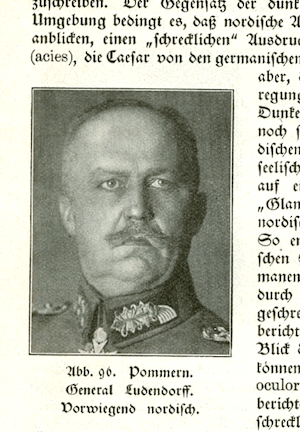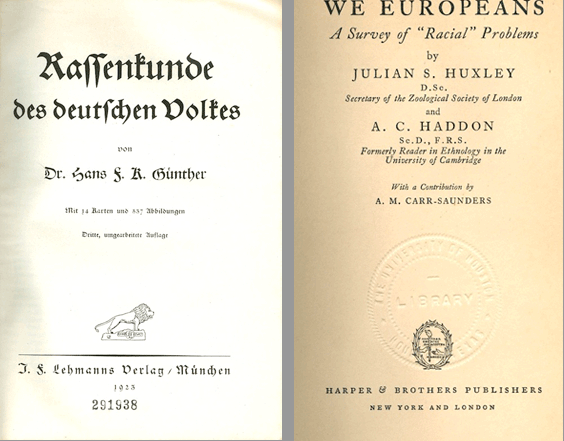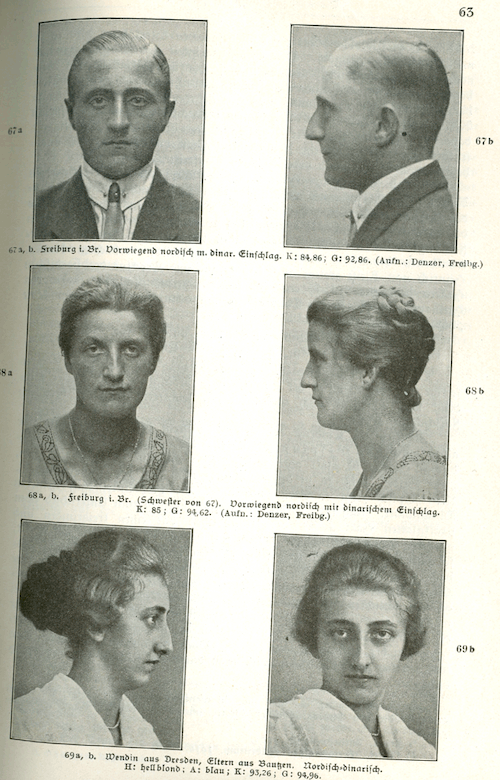Racial Mythologies: Günther vs. Huxley
Today, poison in the library. The Honors College at the University of Houston presents this program about the machines that make our civilization run, and the people whose ingenuity created them.
The other day, I was looking for a book I did not want to read. I needed it for a class I was teaching, so I had a reason. But its title filled me with dread: Racial Science of the German People. This was a pre-Nazi publication from 1923. Its author, Hans Günther, began a career of writing about "racial nationalism" back in 1919. He cooked up a Nordic racial doctrine that impressed the Nazi party. Once in power, they made sure to secure Günther a professorship in Berlin, and they showered him with honors. His so-called science gave them cover for their hateful intentions.

Günther's Nordic Ideal: Gen. Ludendorff
It's important to look at real historical sources, and that's what drove me to read this ugly book. The truth is, Günther's work shared many elements of eugenic theory that circulated at the time, though not always in such a crudely nationalistic form. But I was hoping there'd be another contemporary work on the shelf that would tell me: we all knew this "racial science" was nonsense. I wanted to know someone saw it for what it was back then.

From left to right: Racial Science of the German People by Hans Günther and We Europeans by Julian Huxley and A. C. Haddon.
To my delight, I found such a book: a spirited work from 1936 by Julian Huxley and A. C. Haddon. The book We Europeans was a careful attack specifically aimed at the Nazi conception of race. Huxley was definitely the man for the job. He was from a prominent family of British intellectuals, and had real credentials as a biologist. In 1912, he was hired to set up the biology department at the then Rice Institute here in Houston, where he worked for a time. But Huxley left academia to become a popular science writer and wildlife conservationist. Like many thinkers of the day, Huxley had his own eugenic ideas that we find repugnant. But he knew the Nazi's concept of race was just "a social myth," and not science.

Julian Huxley from the Rice University Campanile 1916
In their preface, Huxley and Haddon come out swinging. "In a scientific age," they write, "prejudice and passion seek to clothe themselves in a garb of scientific respectability; and when they cannot find support from true science, they invent a pseudo-science to justify themselves." Nations are a matter of passions, sentiments and cultural traditions. They are not like biological species. The authors quip dryly that one can define a nation as "a society united by a common error as to its origin and a common aversion to its neighbors." They point to Americans as a good example of a nation that shares no common biological heredity; and yet we are as much a nation as any other. Time and again they point out the logical flaws and blunders in method that led to the current "racial mythology." In their conclusion, they declare, "biologically it is almost as illegitimate to speak of a 'Jewish race' as of an 'Aryan race.'" So much for Günther and the Nordic ideal!

"Germanic racial types" from Günther's Racial Science of the German People
Günther's work is ugly; but I don't believe in burning books. I leave that to Nazis. But I am relieved to find that on the same shelf in the library, a poison and its antidote are placed side by side. Some ideas are dangerous; some ideas are wrong; but the only cure for bad thinking is better thinking.
I'm Richard Armstrong, at the University of Houston, where we're interested in the way inventive minds work.
(Theme music)
Barkan, Elazar. The Retreat of Scientific Racism: Changing Concepts of Race in Britain and the United States between the World Wars. Cambridge: Cambridge UP, 1992. Chapter 6 in particular gives a detailed discussion of the importance of We Europeans.
Günther, Hans F. K. Rassenkunde des deutschen Volkes. Third revised edition. Munich: J. F. Lehmanns Verlag, 1923.
Huxley, Julian and Haddon, A. C. We Europeans: A Survey of "Racial" Problems. New York and London: Harper and Brothers, 1936.
Huxley's own ideas on eugenics are complicated, but this site gives you a quick look at their range and development: http://julianhuxleyeugenics.blogspot.com/p/huxley-and-eugenics.html
For an example of the rather mystical conception of blood and race used by the Nazis, see the radio address by Walter Gross from 1935, "Blood is Holy." Gross was then head of the Nazi Party's Racial Policy Office. It is this kind of quasi-religious and pseudo-scientific racism that Huxley and Haddon were ridiculing in their book.
Translated and available online at: http://www.calvin.edu/academic/cas/gpa/gross3.htm
This episode first aired on May 8, 2013.